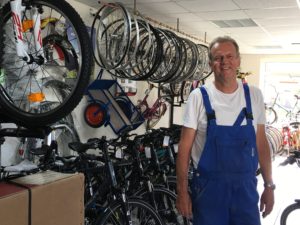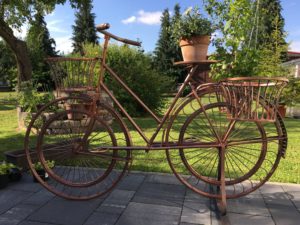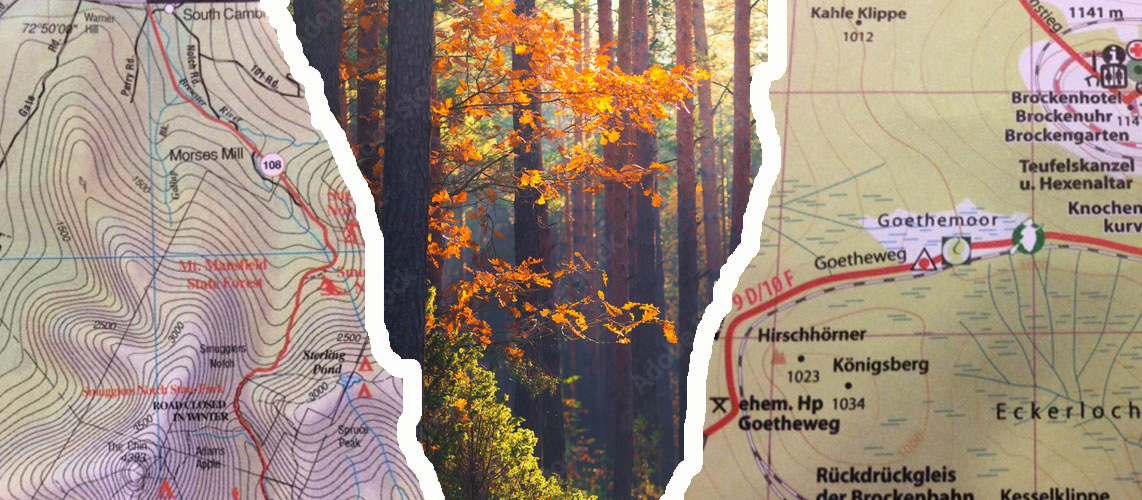
Somewhere along my first breezy descent from Point Alpha to Geisa I had noticed that the numbers on the odometer were not moving. While the bliss of flying down the hill almost made the moment seem timeless, there was likely another reason. I checked whether the sensor lined up properly with the plastic sleeve that held the magnet on the fork, and it did – but wait, the magnet! I had gone over so many rocks and roots working my way up the hill to Point Alpha that the little magnet could have come loose. I didn’t have a replacement with me, but I had noticed a small sign advertising “Abel’s bike shop” just across the street from my bed & breakfast.
Coming down the hill again after my immersion in Cold War strategies, I remembered the sign and decided that this would be the perfect time to find Abel’s bike shop – besides the odometer magnet, I could use at least a modicum of human contact as an antidote to the day’s sobering dose of history.
I arrived at Abel’s 30 minutes before closing and found Mr. Abel cheerfully finishing work on another customer’s bike and then turning his attention to me and my (father’s) bike. The magnet was quickly supplied and cost all of €2. Even without my packed bike panniers, it was clear that I was not from anywhere near Geisa (besides my north German accent, the manufacturer’s sticker on my bike said “Bremer Rad” (Bremen bike) in large red letters), so Mr. Abel asked what had brought me to his corner of Thuringia. I told him about my expedition, and from there we were off on a wide-ranging conversation that, I’m afraid, lasted quite a bit beyond his closing time – about life in the GDR and the Sperrgebiet, about how he came to be a bike shop owner, and about people who come into his shop to try out bikes only to then order their favorite model online.
While he is naturally not pleased about pseudo-customers like that, I could tell that he loves his work and that his “real” customers and their bikes are in excellent hands. At one point during my visit, he showed the different types of tires to another customer and explained the value of the new “unplattbar” (“unflattable”) type even though he could make more money by selling the regular type that has to be replaced more often. He knows the value of his own work, I thought to myself, and he does not let short-term disappointments get him down. As he told me more about his life, I realized that this outlook ran in the family and had withstood the sometimes exasperating challenges of life in the GDR. From his grandfather’s business of manufacturing wooden carts and sledges, his father had developed a specialization on brake components. When the GDR regime tried to make his business part of a state-owned production cooperative, his father had resisted (no doubt taking a professional risk), but had won – because of the quality of his work and because his product was needed. Something similar had happened to his son later – during one of Mr. Abel’s mandatory stints as a reservist in the National People’s Army (NVA), his superior tried to bully him into extending his deployment because Mr. Abel’s skills as a car mechanic were so useful to the NVA. Mr. Abel declined; the bullying continued, and finally he resorted to what was known in the GDR as “Vitamin B” – short for Beziehung (= relationship; “Vitamin B” denoted the network of relationships one needed to obtain certain goods, favors, or positions): He turned to a doctor in his network and was able to obtain an exemption from NVA service.
It was “Vitamin B”, too – along with a dose of self-iniative – that got Mr. Abel his training as a car mechanic. When he was nearing the end of his school years, he scraped up his courage to approach a director at Wartburg (the other GDR car make, besides Trabant) who occasionally did business with his dad, and asked him about the possibility of an apprenticeship. He still had to go through the normal process of applying, but thinks that the personal connection likely made the difference.
When I asked him how the process of reunification had gone in his view, he said that he absolutely values the freedoms he has now, but also commented that “the comrades still get their advantages” and cited the example of a former SED party official who had been able to buy a manufacturing plant at dumping prices from the Treuhand (the organization that was set up in March 1990 to transform the GDR’s planned economy into a social market economy) – something that is far from a unique occurrence.

Rather than get bogged down by these kinds of injustices, though, Mr. Abel focuses on the things he has control over, and that is his own work and his own attitude. In fact, he was the first person from whom I heard a positive – though tongue-in-cheek – perspective on life in the Sperrgebiet (the 5 kilometer exclusion zone): You did not have to lock the door at night (because no one could get near your house other than the few other people in the Sperrgebiet), and you knew there would be no unannounced visits.
I thanked Mr. Abel for the help with my bike and for the conversation. While he likely had to put up with more chicanery than he told me, his spunky attitude can serve as inspiration for anyone in situations that feel oppressive or claustrophobic.

Mr. Abel was a good find! Love reading your blogs.
This is a great post! I was there with you in that little shop past closing time. And I too admire Stefan’s attitude. One thing that might be fertile ground to write more about is Vitamin B. I knew that there were ways to get things done in communist countries, but I guess I’m interested in the people that operated those underground systems. Where they forces for good? My guess is that it’s complicated.
Wonderful insights from your conversations with Mr. Abel, Kerstin … you’ve managed to give us a peek at the barriers that had once separated East and West Germany … thank you for giving voice to former East Germany citizens and to the complicated and intricate process of re-unification.